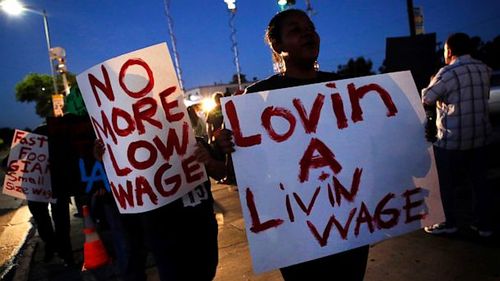‘Living wage’ sponsor looks to exempt 2,400 workers from annual wage hike

LIVING WAGE EXEMPTION: A Milwaukee County supervisor who sponsored the county’s living wage law has drafted an ordinance exempting close to 2,400 county-contracted employees from receiving the annual wage hike.
By Adam Tobias | Wisconsin Reporter
MILWAUKEE — A Milwaukee County board member who sponsored a union-boosting “living wage” law worries the increased spending could cut thousands of jobs and bankrupt a government program that helps the elderly and disabled.
Supervisor Willie Johnson Jr. fewer than eight months ago told colleagues approving the living wage was “the way to go” because it would give lower-paid employees the same dignity and self-esteem as higher earners and curb reliance on government assistance.
“I believe strongly in this measure,” Johnson said at a Feb. 6 board meeting, where the living wage law passed in a 12-6 vote.
SECOND THOUGHTS: Milwaukee County Supervisor Willie Johnson Jr., who sponsored the county’s living wage law, is now looking to exempt 2,400 workers from the annual wage increase.
Now, the 14-year supervisor has drafted an ordinance, obtained exclusively by Wisconsin Reporter, that seeks to exempt what is arguably the largest pool of county-contracted workers from receiving an annual living wage increase.
Under Johnson’s proposal, the nearly 2,400 supportive home-care employees who provide services for the Milwaukee Department of Family Care would be paid a guaranteed minimum wage of $11.47 an hour effective with their 2015 contracts.
Every year after that, all raises would be at the discretion of the Family Care director and would depend on the amount of funding the agency receives from the state, ongoing expenses and the ability to serve all members and maintain reserve requirements.
The starting hourly wage for county-contracted supportive home care workers is $10.27, more than $3 higher than the federal minimum wage of $7.25. The employees, who do not need nursing licenses and typically take care of family members on a part-time basis, got a pay increase or bonus in each of the past three years.
Johnson did not return Wisconsin Reporter’s requests for an interview, but his ordinance indicates he is asking for the amendment because of the fiscal impact of the living wage on taxpayers and government services.
But what’s puzzling is the Milwaukee County Comptroller’s Office cited the financial risk to board members before passage of the living wage law.
With the Department of Family Care alone, the annual living wage increase is expected to cost taxpayers about $21 million through 2019, according to County Comptroller Scott Manske’s latest estimates.
Those added expenses would result in Family Care exhausting reserves by 2019, Manske said.
The Department of Family Care is funded entirely by the state through the Medicaid program. The county agency received $253 million in 2013, but the capitation rate — the monthly amount provided to Family Care for each client served — has either decreased or stayed relatively the same since 2011, Family Care Director Maria Ledger told Wisconsin Reporter.
Manske’s latest report warns his projections focus solely on the effect of the living wage law on Family Care and current reserve levels.
“Other potential cost increases within the program such as other provider rate increases, member utilization increases, County overhead cost increases, and paratransit transportation cost increases are not considered in this analysis but could greatly impact the financial outcomes … if they require additional withdrawals from the reserve,” Manske said in his report.
If reserves are depleted to a level below state requirements, the county board would need approval from the state to use the county tax levy to fund the Department of Family Care. The more likely scenario, Manske says, is the state terminating the county entity.
If the state voids its contract with the county, Johnson’s ordinance says 84 Department of Family Care employees and nearly 500 care managers and nurses could be out of a job. He acknowledges any private organization that replaces Family Care would not be obligated to hire any of the 2,400 displaced supportive home-care workers or pay them more than the federal minimum wage.
But Johnson’s proposal would only delay exhausting Family Care’s reserves by about two years, Manske said.
“It does not fully mitigate the financial risk attributable to the (minimum wage ordinance).”
Still, Supervisor Deanna Alexander, who voted against the living wage law, intends to support Johnson’s amendment and may ask to be a co-sponsor.
Alexander says the change keeps the periodic decision-making in the hands of the Family Care director, the administrative professional who “knows the most about the program and works within it on a daily basis.”
But Alexander is concerned Supervisor David Bowen will try to postpone the introduction of the ordinance until after he takes office in the State Assembly, so he can avoid voting on the legislation.
Bowen wrote Milwaukee County’s living wage law with help from Service Employee International Union-affiliated officials. Bowen, who has received numerous campaign contributions and political endorsement from SEIU, successfully requested a “political retribution” audit of a Family Care provider who has been an outspoken critic of the living wage law and has refused to force the staff to join SEIU Healthcare Wisconsin.
“To vote in favor of this would cause (Bowen) to admit that his SEIU-authored living wage ordinance was faulted, and to vote against it would cause a divide between him and a respected senior member of the county board who supported the original ordinance,” Alexander told Wisconsin Reporter.







